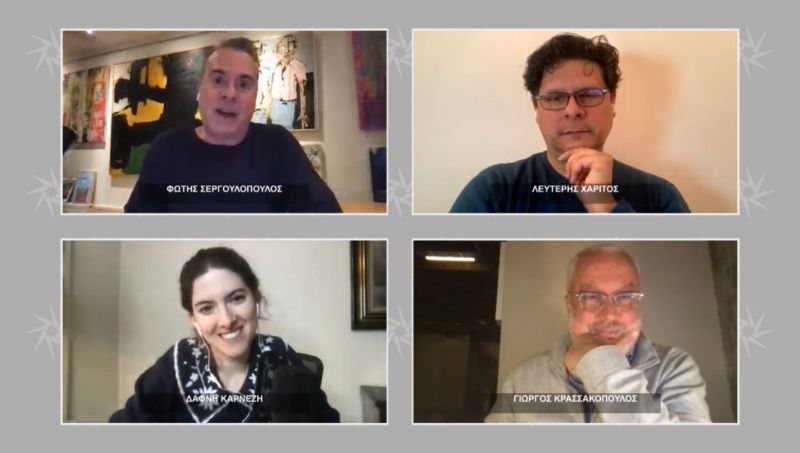Online 23rd TDF: Live open discussion on podcasts
The 23rd Thessaloniki Documentary Festival’s live open discussion took place on Thursday March 11, online. Presenter, actor, entrepreneur Fotis Sergoulopoulos (podcasts LIFO), director Lefteris Charitos (pod.gr) and journalist Daphne Karnezis (The Greek Podcast Project) revealed some of the secrets that make a podcast successfull. Head of programming Yorgos Krassakopoulos coordinated the discussion, while Festival director Orestis Andreadakis referred to the new podcast section of the Thessaloniki Documentary Festival.
“Podcasts was always a big companion for me” said Daphne Karnezis. “When I came back to Greece, after 10 years in the UK, I did not know that I wanted to start a company on podcasts. Through it, organizations and companies approached me, in order to communicate with their audience. That’s how our production company The Greek Podcast Project was founded”.
“The pandemic and the confinement at home made me do other things besides television. I did some talks on topics that concern the LGBTQI community, and I gave them to LIFO. Afterwards, I received a proposal to make a series of podcasts. I started as an amateur. I wanted people from the LGBTQI community to talk themselves about the issues that concern them and not have others talking about them”.
Speaking on his involvement with podcasts, Lefteris Charitos said: "I have been listening to podcasts for 5 years, mainly American podcasts. I met a friend who liked podcasts as much as I did and so we started, completely amateurishly. At some point, we founded the company pod.gr".
Regarding the relationship between podcasts and radio, Mr. Sergoulopoulos said: "For me, a podcast is a show, but not a radio show. The podcast is addressed directly to the listener, while the radio is something that is heard in the background. The podcast accompanies me, entertains me, but I can also get some information from it. If I wanted to compare it with the written word, I would say that the podcast is a book, while the radio is a magazine".
"Radio is something live, while podcasts are optional. You can download them and listen to them whenever you want. In the car, when I go for a walk, I download podcasts and listen to them. In addition, podcasts are relatively timeless. You can, if you want, listen to non-current issues", noted Mr. Charitos.
“Podcasts are not radio on demand. They are a different medium with a different purpose. Also, it is not live” said Ms. Karnezis. “You can process and edit all the material you collect. I think it has a lot in common with cinema. Finally, its immediacy is greater than that of the radio," she added. As for whether it could become part of a radio show, Ms. Karnezis noted that a podcast could find its place on the radio.
Mr. Sergoulopoulos said that "the podcast is an anarchist medium. It is not governed by the rules of the traditional media. There is still a freedom, it does not seem to be subject to strict rules. And most importantly, there are no comments. You do not know if people like it or not, and you do what you want. You need to know how to say what you want to say, in order to communicate with your audience."
Asked how one can learn more on how to make podcasts, Mr. Charitos said: “There isn’t a college for podcasts. They are like directing or chess. They seem easy, but it is hard to get really good at it. The knowledge comes with experience. Of course, there is a lot online on how to make podcasts, so one can get inspired”. Mr. Sergoulopoulos said that “anyone can make a podcast. But you need to have something to say, a story, a theme. I think that in 2 or 3 years there will be a peak and after that podcasting will take its true form”. Daphne Karnezis said: “I think that anyone can make podcasts, as long as they have a story to tell. It’s important to listen to a lot of podcasts and there are also several newsletters, which inform you on technical issues”.
Speaking about what it needs to start a podcast, Fotis Sergoulopoulos said: “A podcast doesn’t always need to be technically perfect. Usually, it is the information that stimulates the interest. It seems that at some point there will be many levels of podcasts. Like in movies, you will have low budget podcasts and blockbusters”.
Lefteris Charitos noted "that the art of podcasting is collective. There are many people involved in a podcast. With sound you can create many things, you can excite the listener. The art of fiction in podcasts has taken off. Sound effects can make you see a movie on your headphones. Right now, there are series in the US that have started with writing a script for a podcast and then moved on to television or to online platforms."
Asked by Daphne Karnezis how he approaches the interviews for his podcast, Fotis Sergoulopoulos replied: "I believe that the interviewee should be informed beforehand. There must be a pre-interview that can lead to the emotions that will then be captured on the podcast. This way you create a relationship of trust with your guest. They must understand that you will not trap them, you will not put them in a difficult position.”















